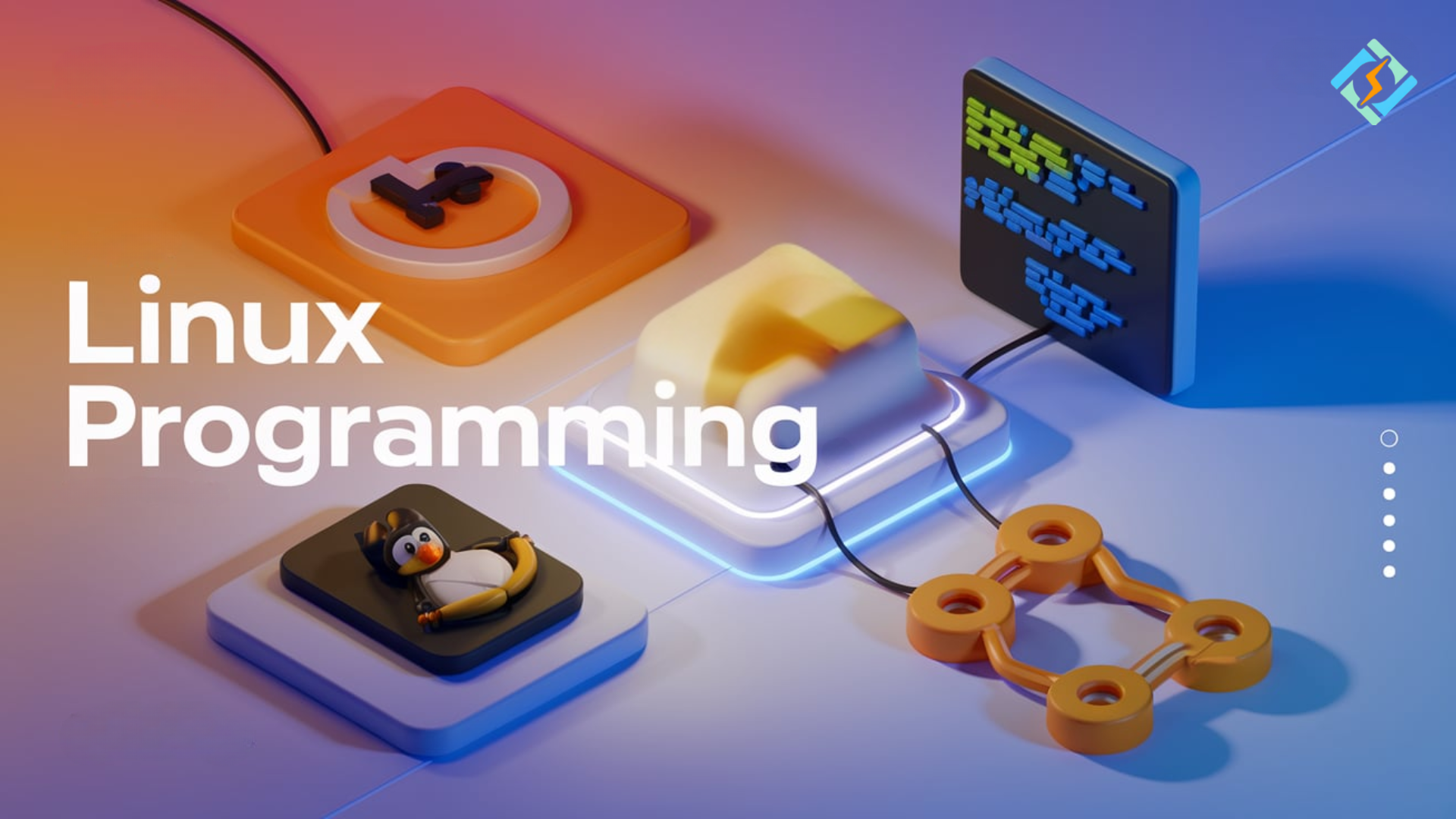Linux is an operating system that power runs from the smartphone to the servers; it is a cornerstone in the modern computing world. It gives great power to the developers, and an open-source architecture makes Linux a haven for those looking to have complete control over their system environments. To unlock the potential of Linux, one has to understand the complication of Linux programming, the key to everything within this robust OS.
Linux is an ideal platform on which programmers ranging from veterans to a novices can experiment with various programming languages, that vary from the low-level C (which forms the basis of Linux itself) to higher-level languages like Python and Java. The flexibility to program in such diverse languages means Linux developers can attack everything from kernel-level tweaks to full-fledged applications and automation scripts.
The strength of Linux lies in the proper integration of code languages into its system operations. Whether writing complex algorithms, automating repetitive tasks, or building high-performance web applications, Linux features the tools and environments that promote creative efficiency this entails in terms of shell scripting to the automation of routine jobs as well as C++ and Go for developing robust system applications. Linux programming allows them to make the digital world.
And what distinguishes the program with a difference is the never-ending avenue for innovation. You’re not just coding; you’re building something greater. In the article below, we go deep into Linux-powered languages. We have all of them with code examples to guide you through the mastering of Linux programming. Whether you are an experienced programmer or merely a beginner, it’s your key source of knowledge and skills to flourish in the Linux ecosystem.
Introduction to Linux Programming
There are many reasons why Linux is distinguished from other operating systems, but it certainly stands out in the matter of programmability. It is open to most programming languages, including low-level ones like C and high-level programming languages such as Python and Java. The applications of Linux programming vary from scripting small automations with batch files and/or shell scripts to the development of massive applications on a personal level, down to development in the Linux kernel itself.
At the heart of Linux programming lies the Linux kernel—the central component of the OS that manages system resources and hardware. Much of Linux programming will involve direct interaction with system calls and libraries generated by the kernel: understanding exactly how it works is crucial for developers.
Get exclusive access to all things tech-savvy, and be the first to receive
the latest updates directly in your inbox.
Programming Languages Used for Linux
Linux supports a wide variety of programming languages. Some of the popular programming languages to develop for Linux are:
C: C is the backbone of the coding of Linux. The Linux kernel, too, is written in C. Therefore, this language is essentially required for low-level system programming.
C++: Though it has applications primarily for application development in Linux, C++ is an essential language for developing GUI-based applications.
Python: Python is one of the easiest programming languages developed, famous for simplicity and readability, and therefore used widely in the fields of scripting, automation, and web development.
Shell Scripting: There are mainly bash and other shell scripts that find immense usage in automating the system and configuration.
Java: Java is a famous programming language of Linux for its cross-platform capabilities. This has led Java to be widely used in web application development on Linux servers.
Go: As Go is a statically typed language, it is fastly finding an application in system software programming as the compiler does not take any effort over the runtime.
Shell Scripting: The Soul of Linux Automation
Shell scripting is an important part of Linux programming. Using shell scripting allows a programmer to write a script that can be used to automate similar operations, such as managing system configurations, making system backups, and file manipulation. Most of the time under Linux is the Bash shell, which even though very flexible, is in most use for automating tasks.
Simple Shell Script Example:

Explanation:
- #!/bin/bash: This specifies the script interpreter.
Output:


C Programming under Linux
C is the lifeblood of Linux programming. It allows developers to write low-level system code, directly interact with the Linux kernel, and gain low-level direct access to all system resources. For these reasons, C remains the most popular language for system-level programming in Linux.
C Program Example: Hello World

Explanation:
- #include <stdio.h>: Includes the standard input/output library.
- return 0: Exits the program.
Output:

Linux Python Programming
Python has great usage in the realm of Linux. It is typically used for scripting, web development, and automation because of its readability and vast libraries. It is also widely used to write applications for Linux based on the need for prototyping speed.
Example Python Program: Simple Calculator
Here is the code:
def add(x, y):
return x + y
def subtract(x, y):
return x - y
def multiply(x, y):
return x * y
def divide(x, y):
if y != 0:
return x / y
else:
return "Division by zero is not allowed."
print("Select operation:")
print("1. Add")
print("2. Subtract")
print("3. Multiply")
print("4. Divide")
choice = input("Enter choice (1/2/3/4): ")
num1 = float(input("Enter first number: "))
num2 = float(input("Enter second number: "))
if choice == '1':
print("Result:", add(num1, num2))
elif choice == '2':
print("Result:", subtract(num1, num2))
elif choice == '3':
print("Result:", multiply(num1, num2))
elif choice == '4':
print("Result:", divide(num1, num2))
else:
print("Invalid input")Output:
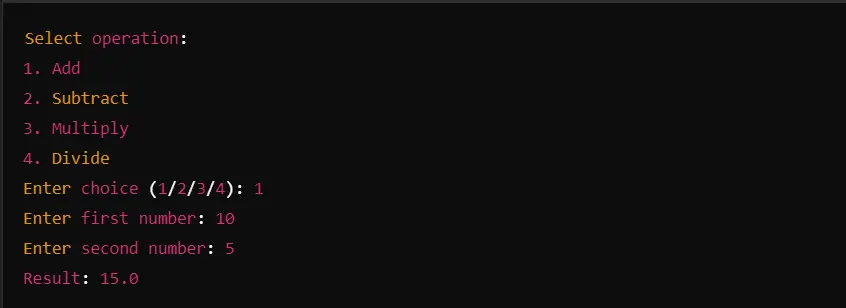
Programming in Linux with C++
C++ is even extensively used in developing complex applications under Linux, such as GUIs and large-scale system applications. It also utilizes the features of C and provides additional object-oriented features, with low-level system access.
C++ Program Example: Class and Object
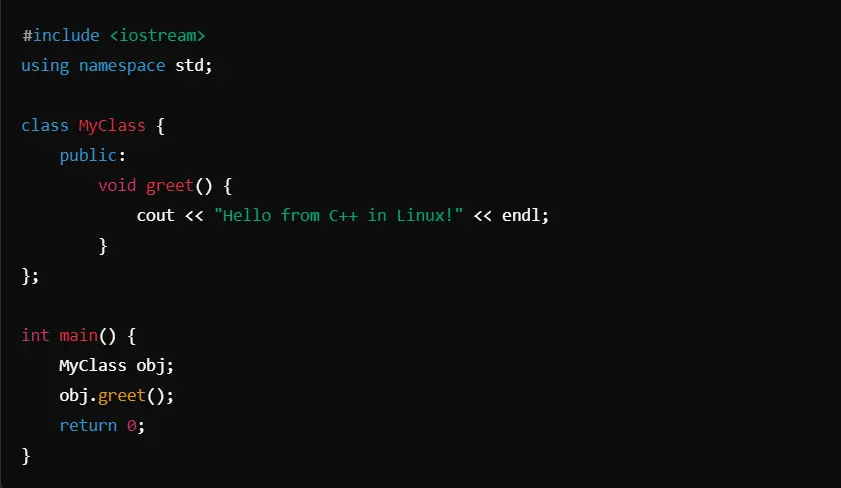

Java Programming for Linux
Java is the most popular programming language used in Linux, mainly on the server side for web applications and other enterprise applications. The advantage of using Java as a programming language is that it is cross-platform due to the presence of the JVM, which makes it native to Linux servers.
Example: Hello World in Java


Go Programming Language in Linux
Go or Golang, which is developed by Google, is gaining popularity in Linux programming due to its concurrency model and simplicity. It is particularly suitable for system programming and server-side applications on Linux.
Example Go Program: Simple Web Server
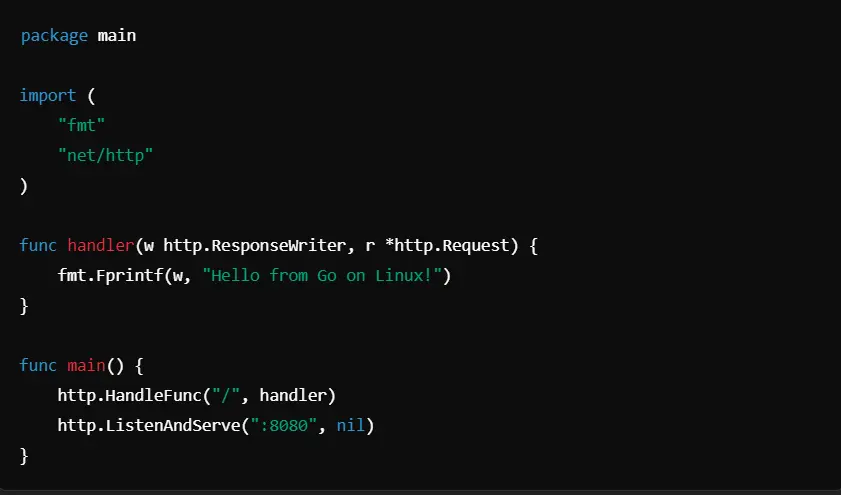
Output: When you visit http://localhost:8080 in your browser, the output will be:

Linux Development Tools
Linux has very many development tools that make programmers’ work easier.
GCC (GNU Compiler Collection): This is the standard compiler for C, C++, and even more.
GDB (GNU Debugger): It is a powerful debugging tool for C/C++ applications.
Make: This is a tool that automates the building and compilation of an application.
Vim/Emacs: These are the most popular text editors that can be extensively customized for programming purposes.
Git: This is a distributed version control system most commonly used on Linux to manage code.
Sample Code: Writing a Linux Shell Script
Here’s an example of a simple shell script that counts the number of files in a directory.


Sample Code: Writing a C Program in Linux
A basic C program that demonstrates reading and writing files in Linux:
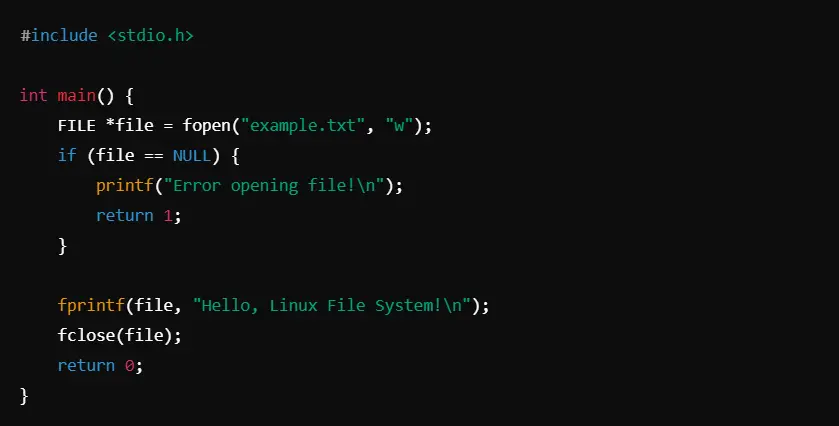

Sample Code: Writing a Python Program in Linux
Here’s a Python program that reads and writes to a text file:


Role of CyberPanel in Linux Programming
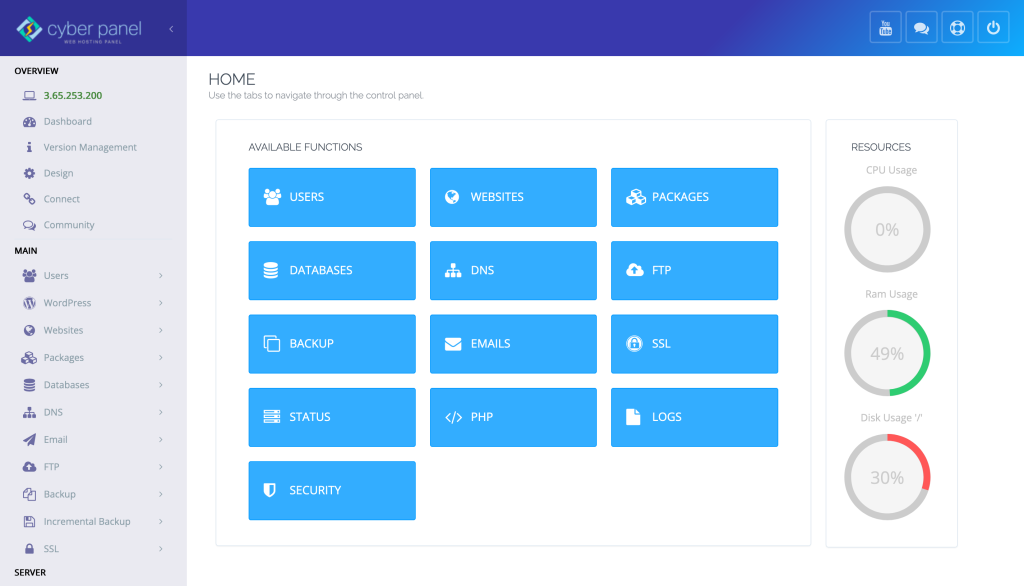
CyberPanel is an extremely powerful open-source web hosting control panel, which actually simplifies server management tasks and can hence make the efficiency of the Linux programming better. Built on top of OpenLiteSpeed, CyberPanel gives developers and administrators the best tools to manage their web servers, databases, and email services most efficiently. Thanks to the intuitive graphical interface and automation tools, it is much easier to deploy applications to a Linux server and, then manage it. This is essentially a hosting environment for web applications alongside the possibility to configure the server environment so that it performs at an optimal level. And hence, this makes CyberPanel the better tool for both beginning and advanced developers of Linux.
FAQs On Linux Programming
1. Which programming languages can be applied in Linux programming?
Linux supports a wide variety of programming languages, including C, C++, Python, Java, Go, Shell scripting, and much more.
2. Why is C the most popular programming language for Linux programming?
C is the fundamental language for the Linux kernel, which allows direct interaction with system resources and effective control over memory, making it very useful for low-level system programming.
3. What are some common programming tools on Linux?
Some of the most popular programming tools are GCC, used in compiling code; GDB to debug the code; Vim/Emacs for actually coding; and Git for keeping track of versions.
4. Is Python useful for Linux programming?
Python is excellent for Linux programming, especially for scripting, automation, and rapid application development, due to its simplicity and support of extensive libraries.
Culmination: Craft Your Future with Linux Programming
To sum up, I will say, that Linux programming offers you a unique combination of control, flexibility, and scalability that few others can even begin to match. From automating tasks to the creation of the latest cutting-edge applications or system-tweaking attempts, all of it happens within the perfect breeding ground with Linux. Explore the world of Linux programming today and transform your coding skills into a powerful tool for innovation.
Ready to dive deeper? See how CyberPanel will make your Linux programming journey much easier by simplifying your server management and empowering your developmental efforts. The next step unlocks your potential in the world of Linux!
